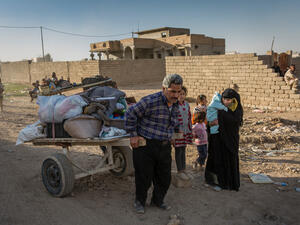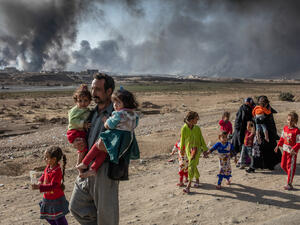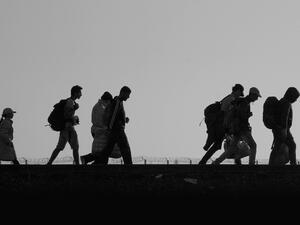Fall in refugee numbers, but rise in others of concern in 2004, says UNHCR
Fall in refugee numbers, but rise in others of concern in 2004, says UNHCR
GENEVA, June 17 (UNHCR) - The UN refugee agency today announced that while the global number of refugees fell 4 percent in 2004 to 9.2 million, the lowest total in almost a quarter of a century, the numbers of internally displaced and stateless people remain high.
According to UNHCR's annual year-end statistics for 2004, released ahead of World Refugee Day on Monday, the total number of people of concern to UNHCR rose to 19.2 million from 17 million the previous year. This figure includes refugees, asylum seekers, returnees, stateless people and a portion of the world's internally displaced people.
"Behind every number is a human being," said António Guterres, who began work as the 10th UN High Commissioner for Refugees on Wednesday. "While we can be glad there has been a reduction in refugees and an increase in the number of returnees, we must remember that each one of those 19.2 million men, women and children has suffered the trauma of displacement - as have many millions of internally displaced people who are not currently being cared for."
An almost unprecedented level of voluntary repatriation was largely responsible for the decline in the global refugee number for a fourth year in succession, noted Guterres. In all, more than 5 million refugees have been able to return to their home countries since the end of 2001 - 3.5 million of them to Afghanistan alone.
In 2004, a total of 1.5 million refugees repatriated voluntarily, with 27 different countries receiving more than 1,000 returnees during the year. Major returns movements were to Afghanistan, Iraq, Angola, Burundi, Liberia, Sierra Leone, Somalia, Rwanda and the Democratic Republic of the Congo.
However, the number of people of concern to UNHCR grew last year by just over 2 million to 19.2 million, partly as a result of the additional responsibility to help protect 660,000 displaced people in Darfur, and an increased government estimate of the number of displaced people in Colombia. Another factor was a rise in the number of stateless people and others in a similar predicament who also fall under the agency's mandate.
Afghans remain by far the biggest refugee group in the world at 2.1 million, but Sudanese accounted for the largest increase in 2004, producing over 125,000 new refugees, mostly fleeing the Darfur region to neighbouring Chad.
The top countries of asylum were Iran and Pakistan with mainly Afghan refugees. The other largest asylum countries are Germany, Tanzania and the United States, which all showed a drop in numbers.
Guterres leaves Sunday on his first field mission, to northern Uganda, and will spend World Refugee Day in Ikafe refugee settlement. He said it was highly appropriate that the theme of this year's World Refugee Day was 'Courage'.
"I salute the courage of the many millions of refugees, internally displaced people and all the others in similar situations," he said. "They face daily challenges the rest of us cannot even begin to imagine."








